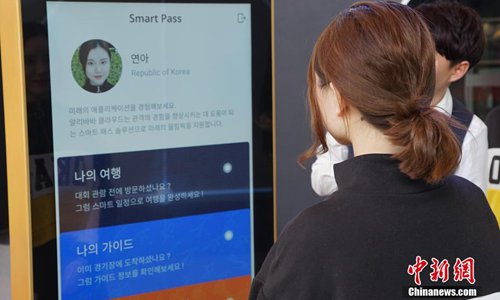HOME >> CHINA
Personal data sold online
By Cao Siqi and Leng Shumei Source:Global Times Published: 2019/9/11 23:13:41
Legal experts call for speedy roll-out of AI law

Smart Pass correctly identifies a woman and displays her personal information on the screen. Photo: Chinanews.com
A Chinese e-commerce platform stopped sales of facial data of about 2,000 people, including those from foreign databases, after media reports revealed the sales. Legal experts called for a speedy roll-out of a law for the fast-growing artificial intelligence (AI) industry.
Some of the data was previously sold on a Chinese e-commerce platform, according to a report by Beijing Youth Daily on Wednesday, which did not name the platform.
The data included 50-100 photos of each person and detailed data about each photo, including the location of the face in the photo.
The seller told the Beijing Youth Daily reporter who pretended to be a buyer that he was an employee in the AI industry, and had easy access to people's facial data.
He said he captured part of the data from search engines and the other part from a foreign software company's database,
The platform confirmed with the media that the sale violated their rules and has been stopped.
However, Mao Lixin, a Beijing-based lawyer, told the Global Times that shutting down the sales is too lenient, and that such companies should be banned from entering the AI industry.
Some of the people included in the data were celebrities and some were children, according to the report.
One of the people included in the data, surnamed Li, was shocked when reached by the Beijing Youth Daily. Li said he had never authorized anyone to collect or sell his photos and facial data.
Yun Fei, an engineer at Hangzhou-based cloud service provider Upyun, warned of risks from fraudsters using the data. He suggested that facial recognition functions should not be used except for financial or vital services.
The case came soon after a face-changing app, Zao, triggered heated discussion on Chinese social media over its controversial user agreement that allows the app to store and use users' data without payment.
Legal experts said personal biological data obtained by facial recognition technology is part of personal information. They called for the speedy roll-out of a personal data protection law.
The personal data protection law is on legislators' agenda for 2019. It is part of the country's five-year legislation plan for AI law proposals. A data security law and an amended law on science and technology progress are also on the agenda.
China has several laws and regulations for protecting personal information but they are scattered and a specific law on personal information protection is badly needed. China's Criminal Law stipulates that selling or providing personal information, if the circumstances are serious, will result in jail sentences of up to three years. If the circumstances are particularly serious, the offenders shall be sentenced to not less than three years and not more than seven years in jail.
RELATED ARTICLES:
Posted in: SOCIETY